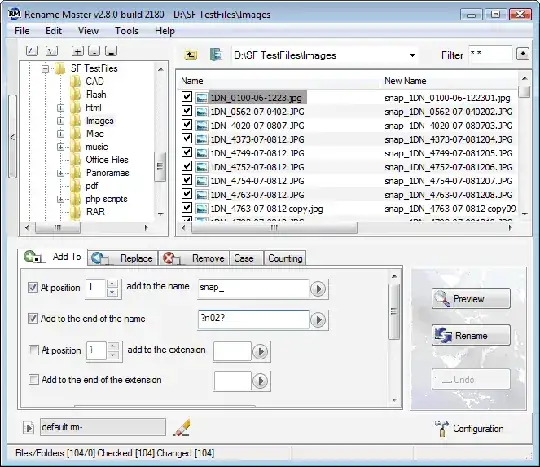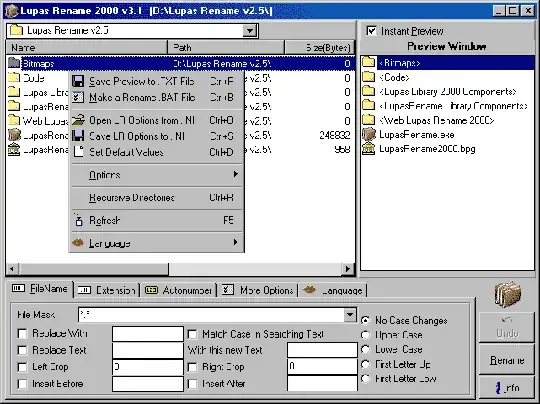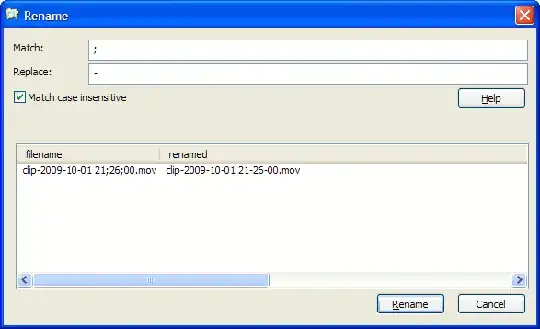Updated:
We're under the assumption that "clip-2009-10-01 21;26;00.mov" is not the actual filename; one possibility is that the actual filename is "clip-2009-10-01 21:26:00.mov". However, we can't verify that under Windows.
We may not need to.
Failsafe Method:
Boot to a Linux LiveCD. Ubuntu 9.04 has good NTFS support, and Linux handles a lot more wonky-characters-in-filenames than Windows. The perl rename script may be included as the system's rename command.
This-Might-Actually-Work Batch Method (New Script!)
The DOS command DIR/X shows short filenames, if they exist on your system.
$ cmd
c:\test> dir /x
Volume in drive E is NUVOL
Volume Serial Number is 80D3-A96D
Directory of e:\tor\test
10/04/2009 05:15 AM <DIR> .
10/04/2009 05:15 AM <DIR> ..
10/04/2009 05:11 AM 0 CLIP-2~1.MOV clip-2009-10-01 21;26;00.mov
1 File(s) 0 bytes
2 Dir(s) 5,201,670,144 bytes free
If they do exist, the REN command will move them to a new name; the new name can be a new (valid) long filename.
c:\test> ren CLIP-2~1.MOV "clip-2009-10-01_21-26-00.mov"
That's how to fix one.
To batch process all of them, you need to 1) grab a listing of all the files you want to move; 2) run a short perl script to convert your listing into a batch file with the appropriate REN commands; and 3) run the resulting batch script.
c:\test> dir /x > mybrokenfiles.lst
$ cat mybrokenfiles.lst | perl -lne 'next if not /MOV/; s/^.{1,39}//; s/^/ren /; s/ (\d\d);(\d\d);(\d\d)/_$1-$2-$3/; print' > fixmybrokenfiles.bat
c:\test> fixmybrokenfiles.bat
The perl commandline assumes a very particular input format, so if the DOS listing shows long filenames in something other than the "21;26;00.mov" format, it probably won't do exactly what you want. If you try it, double-check that the batch script looks right before running it.
If you are comfortable with perl (or sed/awk, python, whatever), you can script this yourself. But if DIR/X doesn't show the short filenames, your system has them disabled, and this solution won't help.
Original answer: not useful with what we know now, but if you copy this sort of file off of OSX again, you can use this BEFORE the copy as a preventative step.
I use the commandline a lot on both Windows and Linux systems. There's a handy perl script floating around the internet that allows batch file renames using standard perl regex's (google for rename.pl to find it).
Under Cygwin on windows, use this in the directory your files are located in to rename them:
$ ls
clip-2009-10-01 21;26;00.mov
$ rename.pl 'tr/ ;/_-/;' *
$ ls
clip-2009-10-01_21-26-00.mov
Pretty sure my version came from the Perl Cookbook:
#!/usr/bin/perl -w
# rename - Larry's filename fixer
$op = shift or die "Usage: rename expr [files]\n";
chomp(@ARGV = <STDIN>) unless @ARGV;
for (@ARGV) {
$was = $_;
eval $op;
die $@ if $@;
rename($was,$_) unless $was eq $_;
}



